On this page you can read the experience of participants from a variety of the activities and retreats that have been organised by SanghaSeva since 2004. If you have been on one of our retreats we would love to hear from you again please share your experience with us
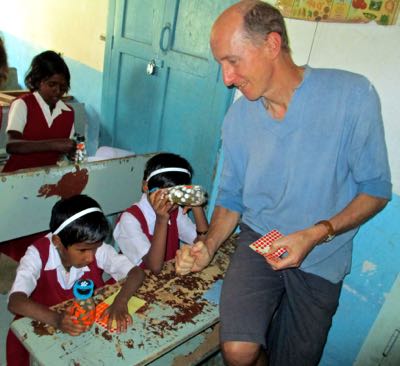
For the blind children sound was their greatest pleasure and nothing symbolised that more than the drumming. In the boys block the arrival of the bag of drums, tambourines and assorted shakers was sheer pandemonium and the bearer of the
bag was soon lost under an avalanche of small, grasping bodies.
Once distributed they would gather in an acoustically amplifying alcove and set to with a dervish-like intensity. Depending on who was leading this alternated between
sharp, staccato rhythms of a repetitive military-cum-festival nature. However, if no coordinating influence was in the mix it could result in an an ear-assaulting cacophony akin to an elephant falling downstairs - albeit one with a
lot of bells attached.
Our main role was to ensure that everyone got a fair share, that the drums weren't hit too hard and broken and that we got them all back at the end. This percussive pandemonium went on to a backdrop of
cricket, skipping, ball games and general playground mayhem.
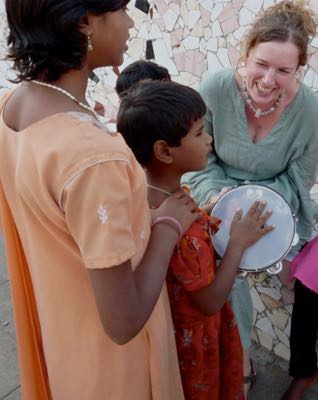 In the blind girls school were two almost identical, totally blind little girls of around 6-years old who
usually played or drummed together. One afternoon I spotted one of them on her own trying to play but the large round-bottomed drum kept slipping off her lap as she sat cross-legged on a concrete bench. I went over and propped the
drum back in her lap and, squatting down in front of her, held the other side so that it was level and would not move. She began to tap away and sing in a squeaky falsetto voice. On and on she went with the same arrhythmic beat and
a Hindi - or Marathi - song.
In the blind girls school were two almost identical, totally blind little girls of around 6-years old who
usually played or drummed together. One afternoon I spotted one of them on her own trying to play but the large round-bottomed drum kept slipping off her lap as she sat cross-legged on a concrete bench. I went over and propped the
drum back in her lap and, squatting down in front of her, held the other side so that it was level and would not move. She began to tap away and sing in a squeaky falsetto voice. On and on she went with the same arrhythmic beat and
a Hindi - or Marathi - song.
Watching her little face with those dead unseeing eyes I was moved to inhabit her world for a while and closed my eyes. All colour and light disappeared. The drumming and her voice continued.
I kept my eyes closed but it was unlike the inky blackness I had once experienced when deep underground and which must be what the totally blind experience.
My legs began to cramp and hurt and so I opened my eyes to see her
still lost in her drum and song trance. A wave of pure tenderness and joy in her joy swept through me. At that moment I resolved to hold that drum for as long as she wanted to play it. So against a background of general noise and occasional
attempts at interruption I held that drum in spite of increasing discomfort. I have no idea how long it went on for but when she stopped with a final flurry of taps I was immensely moved to see a delighted smile on her tiny mouth.
David Ashby
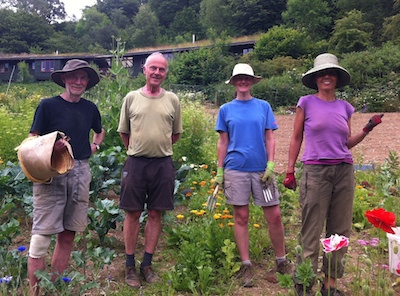
The Sanghaseva reteat at CAT was great!
I feel nourished and revitalised with lots of ideas for how to face the world and all its challenges calmly and with compassion.
Thank you for a wonderful inspiring retreat. This time
has given me new hope and surprising energy. The combination of meditation, mindfulness, landwork and "the work that reconnects" feels like "me". I am so happy others share this.
I leave with a spirit of generosity
and intention to pass on your generous spirit in what I have to offer.
Phil Pritchard
I found Anandwan an inspiring and humbling experience. There were so many moments of joy and sharing of
the heart.
I was moved to tears so many times in the first couple of days, not out of sadness but because of the total openheartedness and dedication of the Amte family (who set up Anandwan) and so many other volunteers. They
offer care, respect and dignity with the community there, which includes lepers, blind and deaf children, and disabled people.
I spent my days in the old people's home, mainly with the men. in the morning I would offer massage to them - backs, legs, arms and head. Often with lepers their circulation is poor, especially in lower arms and legs, so massage is very beneficial, and enjoyable, to them. I could only speak a few words of Hindi, so I was drawn to chant as i massaged, which seemed to amuse them. Some would join in and even make requests towards the end of my stay.
I didn't know how I would feel about working with missing and deformed fingers and toes, and sometimes parts of limbs. As soon as i started, I knew it would not be a problem for me. They had hearts and souls like us all and that is what i made my connection with, not their outer shell. Their skin was incredible, tough, wrinkled, scarred, open sores, sometimes fungal, so sometimes a challenge for me to stay focussed on that childlike, innocent inner being.
Their open smiles and gratitude touched my heart. i wondered in the end who was giving to whom. We shared that giving and receiving, offering us both mutual joy.
In the afternoons a few of us took some of the old people out in wheelchairs. One of their favourite places
was the gardens where Baba Amte and his wife, Sadhanatai (the founders of Anandwan0, have their graves. And a close second was the chai shop where we could give them tea, samosas and biscuits.
Living, working and sleeping with our group of volunteers also offered challenges at times. Finding some personal space, listening to people's anger, sadness, fear, while dealing with my own emotions. For me, the periods of meditation throughout the day really helped with that. it gave me the grounding to stay calm and focussed. The meditation and twice weekly sharings were very valuable to me to connect our energy as a group and to know what difficulties and joys we were all encountering.
The food was excellent, simple, balanced and nutritious. And to know that they grow so much of it themselves is an added bonus.
I have immense gratitude to Zohar and Nathan who obviously have so much love and respect for Anandwan. For their patience and kindness in dealing with us all and for continuing to offer this opportunity for personal growth and service.
It is an experience I would not have missed for anything. The smiles of those lovely old guys will stay with me for a very long time. Hopefully until I go there again!
Linda Vincent
Most days we went to work. I dabbled in cows, children and old people but mainly spent my time in the hospital. I grew to love that place. Mostly we had no idea why the patients were patients but it didn't really seem to matter. We massaged tired and aching limbs. We combed and plaited lice infested hair. We washed filthy clothes. We held hands and stroked faces and tried to give enough love and empathy to last the rest of the year. Some days were quiet and sad. Some were fun and filled with laughter. Some patients seemed to watch their bodies deteriorate with horror and sorrow, mourning the limbs that were slowly being lost through the effects of leprosy. Others seemed to embrace life, bandaging their wounds and carrying on without any emotional connection to their bodies.
From what I witnessed, in the majority of cases, when you develop leprosy you also develop unconditional love. It doesn't
matter who you are, where you come from, your age, gender, ethnic origin or physical appearance; these people open their arms and lives and hearts to the people around them. On the last day I was anxious about getting packed and ready
on time. I had a small to-do list to complete before the taxi arrived so was hurrying, head down to the tailor. The crippled, fingerless lady walking towards me had absolutely no intention of taking offence or letting me get away with
it! On hearing her 'namaste' I looked up to find her radiant, smiling face basically saying "Hey, you're in one of the most loving places on earth, slow down, get your priorities right, you're a human being not a human doing,
we love you, if you walk like that you'll miss it!" How quickly my mood changed. Even though I'd been there nearly a month, meeting many many wonderful people, I am so grateful to that lady for bringing me back down to earth with
a dump and reminding me how easy it is to slip back into old habits and let love and acceptance and kindness and connection come second to the to-do list.
Jody Hart
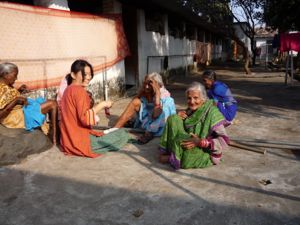 This year in Anandwan I returned with happiness to the old people's home to hold hands (and feet) with
the people there. These sweet souls are the last surviving members of the early years of the community. They lived through a time before a cure and, as such, the secondary effects of leprosy are starkly evident in their aged bodies.
From lost fingers and toes, through flattened palms and amputated limbs, to opaque scratches on blink-less eyes.
This year in Anandwan I returned with happiness to the old people's home to hold hands (and feet) with
the people there. These sweet souls are the last surviving members of the early years of the community. They lived through a time before a cure and, as such, the secondary effects of leprosy are starkly evident in their aged bodies.
From lost fingers and toes, through flattened palms and amputated limbs, to opaque scratches on blink-less eyes.
I go to cut nails. With simple tools I manage each year to campaign against deformed growths on twisted digits
and fungal modifications to the common nail. I go to cut nails, but really I come to hold hands. I'm happy that holding hands is an inevitable side-effect of cutting another's nail. Touch is so healing to the giver and receiver, we
can feel it, and any doubt is lost when we see it in each other's eyes.
These people have had a double misfortune; firstly of catching leprosy, and, the worser one, of being cast out from their family and friends. They have also
had the double good fortune of having a disease with 100% curability, and the possibility of building a new life in a loving community. When the SanghaSeva group arrives more activity is present in the old people's home than at any
other time in the year. 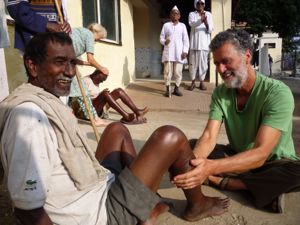 Massage is a common morning sight, hair is being oiled and plaited, in special
cases clothes and bodies are given an extra clean. A loving community is given a love boost. The easily forgotten are given extra attention. I am honoured to be a part of the medication.
Massage is a common morning sight, hair is being oiled and plaited, in special
cases clothes and bodies are given an extra clean. A loving community is given a love boost. The easily forgotten are given extra attention. I am honoured to be a part of the medication.
When a person comes to India and begins to learn a few words of the local dialect they come across a surprising absence. There is no word for please, and the variations of thank you are used so rarely as to be redundant. But this is through
no lack of politeness or appreciation, an english please can be conjugated into the verb. Whereas thank you is deemed joyously unnecessary. If you offer a shukria or a dhanyebad you will be met with a blankness or mystified shake of
the head. This illustrates a strong cultural difference; service is offered freely and as much for oneself as for the recipient. So why would you thank me for doing for us, should I then thank you for receiving for us, and also thank
you for thanking me for doing for me? Where would this end? The 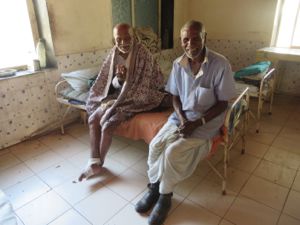 gratitude though unexpressed in words
is implied in the attitude to action.
gratitude though unexpressed in words
is implied in the attitude to action.
So I was surprised this year to hear dhanyebad come from the lips of a freshly manicured man. Has it come to this? These feet I meet can no longer expect the touch they deserve. I recognise sometimes a resistance in my muscles to approach a deformity, yet I have seen no resistance in my heart. I love to be there to be able to help. I love to sit side-by-side holding hands in a garland of nail clippings.
Maybe in time, if I immerse myself in this culture with all my spirit, I will see the emptiness of the conceptualised separation of myself and another. Maybe even to see this life like the great saint Shantideva;
"When I act
for others,
No amazement or conceit arises,
Just like feeding myself,
I hope for nothing in return."
Nathan Glyde
Here are some insights, thoughts and feelings from Dave Adair's blog about the time he spent on the Being Peace retreat. Follow the links to see the great photos he took there.
I flew from Paris to Tel Aviv, via Athens, and after a late-night arrival, made my way to Jerusalem the next day. … the old city of Jerusalem is an overwhelming concoction of history, smells, propaganda, wardrobes, foods, skin colors,
hair styles, tension and young people with guns. As I wandered through the narrow lanes I had the thought that not only do I not have any idea of what goes on here, but that it's actually unknowable. It seems so unbearably complex
that it makes India feel simple in comparison. So you make an effort to learn some history and not pick sides - but for criminy sakes, people, just don't get to the point where you think something about this place is simple.
Read more at blog.daveadair.com/2013/10/picking-olives-in-israel-palestine.html
…
Our group took a tour of the tragic and decimated Hebron, in the Occupied Territories of the West Bank. We've seen and heard a lot of tragic stories about the effects of military occupation here, but in Hebron it's congealed
into some kind of psychotic carnival not-fun-house that no one would believe if it weren't true.
Our tour guide for the day was a 26 year-old former soldier name Shay (pronounced Shy,) from a group called Breaking the Silence. That group is made up of former soldiers
that are coming out about their experiences in the military, and how Palestinians are routinely humiliated and abused. (You really need to read some of their testimonies.
They are chillingly brutal, in ways big and small.) Shay grew up in West Bank settlements in a very conservative family, and decided early in life that he would join a combat unit in the military to protect Israel and its citizens.
… His gung-ho soldiery gradually wilted as he saw the humiliation and degradation of Palestinians that was completely unrelated to security. You have to appreciate the strength of character and soul-searching that it takes for an Israeli
to stand up for the rights of Palestinians. Those who do are marginalized and ignored, at the very least, or referred to as traitors and "self-hating Jews." Shay's current perspective: "We're not here to make the occupation
better - we're here to end the occupation."
Read more at blog.daveadair.com/2013/10/hebron-there-is-no-light.html
…
Of the many great mysteries in my life, here is the latest: how is that it's become socially unacceptable to have a frank and honest discussion about the Israeli government and their policies? Over these last few weeks I've
talked about Israel to quite a few people, and invariably they lower their voice to make sure no one overhears that they're talking about, (shhhhhh...) Israel!
When I left Israel/Palestine a month ago I was feeling oddly optimistic, for the worst of reasons. It seemed blindingly obvious, from my limited experience, that Palestinians are being treated so badly, in so many ways, by the Israeli
government that it's completely unsustainable. It just can't continue.
Read more at blog.daveadair.com/2013/12/my-civic-moral-jewish-humanitarian-duty.html
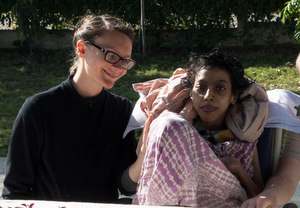 I feel so enormously blessed. I began my journey full of the 'I', and now find myself with a clear knowing of
the 'us'. The experience of love & connection, friendship & compassion, both with the people of Anandwan and the Sangha, have done something to my heart I did not foresee. My heart has been nourished from the deepest of roots.
I know not where the path goes next, but I am clear that it is a path of loving connection in whatever form that may be.
I feel so enormously blessed. I began my journey full of the 'I', and now find myself with a clear knowing of
the 'us'. The experience of love & connection, friendship & compassion, both with the people of Anandwan and the Sangha, have done something to my heart I did not foresee. My heart has been nourished from the deepest of roots.
I know not where the path goes next, but I am clear that it is a path of loving connection in whatever form that may be.
Xulia Duran-Rodríguez
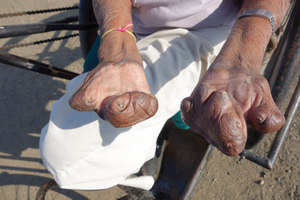 There is a gravitational pull of my heart to the symmetrically arranged wings of the home for the elderly people of
Anandwan. It is a pull I cannot find any reason to resist.
There is a gravitational pull of my heart to the symmetrically arranged wings of the home for the elderly people of
Anandwan. It is a pull I cannot find any reason to resist.
Leprosy is a devastating disease, a bacteria eats away at the nervous system, which, if untreated, leads to deformity and the loss of fingers and toes. But it is not fatal and those who joined the community when young are now getting old. Everyone in Anandwan is cured of this disease for leprosy is 100% curable. Yet the older generation are often seriously affected by the disease. There are a great many people living in the old people's home without any sign of the fingers they were born with. There are many great people there loving without any resistance. I go there for both reasons.
My service was to do nail clipping, and this year it went faster than usual. I tackled the nails that due to some physiological reason had grown into something more resembling a parrots beak than a thumb nail.  I tidied up the neglected and hard to treat fungal distortions of many nails. And I cut the well cared for and manicured finger nails of anyone who asked. It is intimate
and necessary work that brings me close to people, and sometimes quite close to my edge.
I tidied up the neglected and hard to treat fungal distortions of many nails. And I cut the well cared for and manicured finger nails of anyone who asked. It is intimate
and necessary work that brings me close to people, and sometimes quite close to my edge.
When I was finished with nails, I was happy to connect to the fingerless friends who had been absent from my nail-cutting queue.
Something
in me really resonated with a small stocky man with a beautiful smile and calm warmth. Leprosy and life had left him without fingers or toes, and also not many teeth. I gave him a massage each morning, my heart smiled when a really
good rub would bring a smile to his face. And when we parted, he would be shining as he gave me a sweet namaste with his hands together in prayer position. I found his humility humbling.
But not everyone was so sweet, calm and easy to be with. Some people were moved by more demanding impulses, truly understandable when one considers the circumstances that brought them there. As Baba Amte, the founder of Anandwan, had said
"Leprosy of the body we can cure, the bigger problem is Leprosy of the mind." It is "leprosy of the mind" that has led people to push away their partners, their children, their parents, for having a disease. It
is this mind sickness that has created Anandwan's 5000 strong population of outcasts.
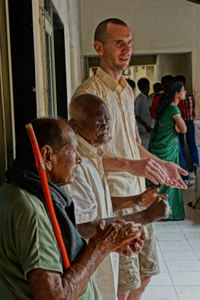 Leprosy of the mind is very common, we've all have a case of it at sometime. Whenever we close our heart to someone
we are showing symptoms. Whenever we are able to love someone even when we don't like their actions we are presenting the antidote.
Leprosy of the mind is very common, we've all have a case of it at sometime. Whenever we close our heart to someone
we are showing symptoms. Whenever we are able to love someone even when we don't like their actions we are presenting the antidote.
Luckily when we occasionally meet the edges of our patience in the elderly home we have many resources to pull on. We have freedom to not react when someone is shouting, demanding or expressing their pain at us. We have the freedom to find a wise and compassionate response. This is when we can feel why we call this a retreat. The work retreat is preceded by a week of silent reflection and meditation, and we continue to practice the same openness to what is arising while living in the community. The main difference being a change of subject; moving the focus from the internal to the external. Somehow practising openness allows acceptance of just about anything, and there is a healing in that, a lightness and a steady alright-ness. It never ceases to amaze me the healing that is not only possible but actually happens during the retreat, and not only to us retreatants but also to our friends in the community.
 Still I was surprised to see that it had left a habitual residue that played out in our actions after the retreat also.
Still I was surprised to see that it had left a habitual residue that played out in our actions after the retreat also.
When Zohar and I were leaving Anandwan our rickshaw driver spotted the bus we were trying to catch pulling out of the station, he swiftly jumped out and managed to stop it. We quickly scrambled onto the packed bus with all our luggage,
throwing things down anywhere while we got out the money to pay the rickshaw driver.
The bus immediately pulled out onto the road and I set about arranging our mess of things. Understandably the conductor didn't like my big
bag being in the aisle. But the bus was so full I couldn't see anywhere else to put it. I gestured that my arms were full and continued to reorder our belongings to take up the least space. It was hard to even stand up let alone lift
heavy bags around, but I managed to turn my bag so there was space to pass it. But he didn't want to compromise and kept barking at me "Move your bag!" I stored my guitar on the overhead rack, and handed Zohar both our small
bags. Again he demanded "Move your bag!" I smiled at him, and raised my shoulders in a shrug, I didn't know what to do.
I heard Zohar saying to the conductor "It's alright darling, we're doing the best we can."
Just like she would to the ladies back at the elderly home. And I found myself instinctively rubbing his back between the shoulder blades. Somehow this loosened the mood just as effectively as it had back in Anandwan. I realised suddenly
we were all smiling, the conductor, Zohar and I, all of us caught off guard by the heart's natural response. In this atmosphere of lightness and love a bag here or there didn't seem to matter so much after all.
Baba was right to say "The joy of Anandwan is more infectious that the disease of Anandwan."
Nathan Glyde
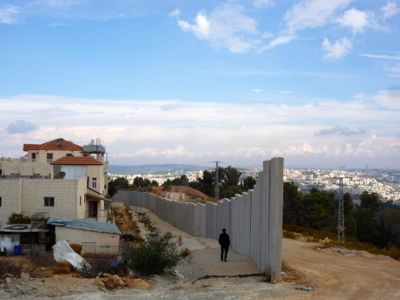 Everybody has a story to tell. This is what I learned while attempting to further my understanding of the
ongoing Israel and Palestine conflict. Unfortunately, these stories predominantly reverberate around suffering, hatred and lasting injustice. In short, they are painful to hear. And after having left these fertile and volatile lands,
after hearing these tales and seeing humanity being lost to fear and distrust, what hope can one retain that peace will ever be mastered between these two deeply scarred neighbours?
Everybody has a story to tell. This is what I learned while attempting to further my understanding of the
ongoing Israel and Palestine conflict. Unfortunately, these stories predominantly reverberate around suffering, hatred and lasting injustice. In short, they are painful to hear. And after having left these fertile and volatile lands,
after hearing these tales and seeing humanity being lost to fear and distrust, what hope can one retain that peace will ever be mastered between these two deeply scarred neighbours?
I am not an expert in this conflict; I am a writer who tries to find reason through writing. In truth, and after two weeks spent listening to stories, I had almost come to the decision that I couldn't comment about this conflict.
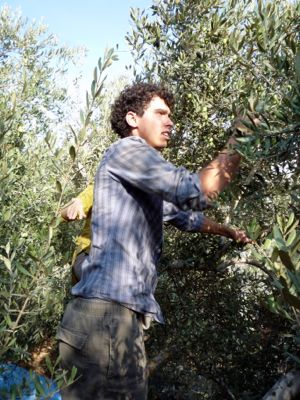 The history is too complex, the wounds too deep, and the helplessness I unknowingly wrote my
way into was constricting. Who am I, an outsider, to think that I can do anything to help this situation?
The history is too complex, the wounds too deep, and the helplessness I unknowingly wrote my
way into was constricting. Who am I, an outsider, to think that I can do anything to help this situation?
However, this was soon changed by one little boy: Isam. I had joined him and his family in his father's olive groves in the rich soils surrounding the Palestinian town of Deir Istiya. By midday, the hot sun was beginning to take its toll,
and in a moment of respite I took to collecting fallen olives in a plastic bucket, seeking shelter in the shade of the trees. Isam left the group and came to help me. Together, we sifted through the dry, crumbling soil, retrieving
the bruised, purple olives. He suddenly looked up and gave birth to a few words that have inspired all that is to follow: "You give me the life in Palestine," he said, faltering over his English. "Talk the world!"
he added. I was taken aback, unable to respond to this boy who had already returned to searching for more olives. "Talk the world," he said again, now pinching the source of his family's livelihood between his fingers. I
was speechless. There was nothing I could say, no hope I could offer him. And in the patter of olives falling into the bottom of the bucket, the moment soon passed, and the harvest continued...
... My hope is to share with you
that even in the midst of conflict, bridges can be formed and relationships encountered – the seeds of peace can still be nurtured.
Read more of Matthew's experience in his book "The Walls Between Us"
Matthew Small
 During this year's Being Peace retreat I was struck by the layers of reality that exist simultaneously.
One momentary example; we rested with a Palestinian family below the trees we had picked together to take lunch. A delicious lunch of houmous, fried egg plant, that just melted sweetly in the mouth, fresh bread baked in the morning,
cool salad vegetables and bowls of golden olive oil. After everyone had eaten their fill, we lay on soft dry grass turned golden by the strong sun, and to me it felt like paradise. But the sounds did not fit the scene, and if one's
sleepy gaze rose from the calm connected foreground to include the whole picture, another less pleasant reality returned.
During this year's Being Peace retreat I was struck by the layers of reality that exist simultaneously.
One momentary example; we rested with a Palestinian family below the trees we had picked together to take lunch. A delicious lunch of houmous, fried egg plant, that just melted sweetly in the mouth, fresh bread baked in the morning,
cool salad vegetables and bowls of golden olive oil. After everyone had eaten their fill, we lay on soft dry grass turned golden by the strong sun, and to me it felt like paradise. But the sounds did not fit the scene, and if one's
sleepy gaze rose from the calm connected foreground to include the whole picture, another less pleasant reality returned.
The olive grove that we were helping to harvest was surrounded on three sides by tower blocks under construction and on the forth; the separation barrier. We were in one of the few groves left by the encroaching settlement, currently encircled
by a fence with a sense of impending destruction.
 The owners of the land lived on the other side of the wall, and were granted permission to pass through a gate
on the wall only 15 days a year. Even then the men of working age were refused permission to pass. The trees were suffering from this neglect. Something that became clear when I picked a well maintained tree nearer a village thus far
still with good access to some of their trees.
The owners of the land lived on the other side of the wall, and were granted permission to pass through a gate
on the wall only 15 days a year. Even then the men of working age were refused permission to pass. The trees were suffering from this neglect. Something that became clear when I picked a well maintained tree nearer a village thus far
still with good access to some of their trees.
There was something else profound that transcended the barrier separating one reality from the other. Something in the look in the eyes, a sort of sad smile, acknowledging the way things were going, and I don't know, maybe still happy to be at all, or, not taking life for granted. I can only guess, and from that guess can only be inspired by those I have had the pleasure to meet.
Nathan Glyde
Also during the retreat we were fortunate to be introduced to the small Palestinian town of Walaja. We had a harvest day there with them in solidarity of their situation, and a tour by Engaged Dharma's Aviv Tatarsky to try and get a grip
of the strange situation they find themselves in. For Walaja has a sad fate; the entire village will be encircled by huge walls and electric fences 360º.
I explain in this article Walaja - Surrounded by the Separation Barrier how such a bizarre and inhumane situation can arise. Please read and share
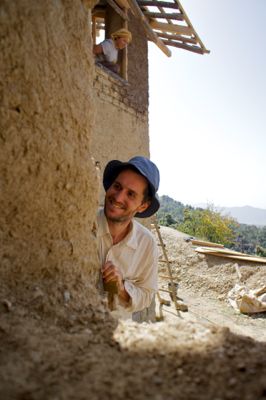 Our second retreat in Dharmalaya was a time for adding layers of loving mud to the
hand sculpted centre for sustainablilty and using our connnected energies to enrich the earth by creating new beds of rich soil and manure. This is work that heals my soul and makes my heart sing, a combination of childish playfulness
- rubbing wet mud on the walls, and mature consideration - supporting the building to grow from architectural designs.
Our second retreat in Dharmalaya was a time for adding layers of loving mud to the
hand sculpted centre for sustainablilty and using our connnected energies to enrich the earth by creating new beds of rich soil and manure. This is work that heals my soul and makes my heart sing, a combination of childish playfulness
- rubbing wet mud on the walls, and mature consideration - supporting the building to grow from architectural designs.
Our nights were spent in tents but on comfortable mattresses. I love 1st class camping. Connected to the planet, making a minimal impact, breathing the air fresh from the grass, and still getting a really soft good night of sleep.
After the retreat we were reluctant to leave from the silence and solitude and traffic free environment of life beyond the end of the road. But I went down into the Tibetan colony an hours walk down the mountain to hear some Tibetan teachings from Tenzin Palmo, an ordained nun originally from London. She was teaching the inspiring 37 practices of a Bodhisattva. I'm convinced that every point of conflict and discord is a doorway to depth and transformation; an opportunity to change myself towards what I truly wish to be.
I am grateful that places of deep sanity like Dharmalaya exist, and I'm looking forward to spending more time there.
Nathan Glyde
Read Mark Moore's write up Dharmalaya Inaugurates Green Hq with Service and Meditation at Dharmalaya.in